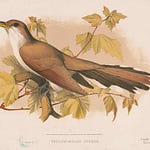Don’t miss our Christmas Special from now through Epiphany — 25% off all new paid, gift, and upgraded subscriptions. See below to learn more.
People have sometimes told me that I’ve got a too rosy view of what people used to make, in art and music and poetry, because I know only of the great things that survived, and not the — I’ll spare you the word they use — that fell into the dustbin. Ah, but they are wrong, about both my attention and what I have seen and heard. For folk art may not be high art, and yet it may still be fine and worthy and strong. You don’t need or even want some fancy plate of coquilles-Saint Jacques every day. Roast beef and potatoes are good too.
And yet the common folk in their directness and very simplicity often touch the sublime, where the learned struggle and sweat and fail. That’s the case with our Poem of the Week, a sweet lyric meant to be sung, composed some time in the 1300’s or 1400’s, and surviving in a single manuscript. Don’t let that hair’s-breadth survival fool you. Some of the greatest poems in English have survived in only one manuscript: Beowulf, Sir Gawain and the Green Knight, Pearl, and many others. Who knows what utter treasures were lost, and how many of them too, when such poems as those have come to us only by the slenderest chance of fate?
Our poem this week is an example of what was quite popular in the days of Geoffrey Chaucer: I mean a poem devoted to the beauty of the virgin Mary, and the beauty of the Christ Child. If Easter was the great feast of the early Church, Christmas began in the Middle Ages to assume its warm and festive place in the human heart. That’s when Saint Francis built the first Christmas creche. That’s when Christmas carols were first composed as folk-poems in all the languages of Europe. That’s when pageantry and childlike glee and gift-giving and the sense of the mysterious holiness of the Nativity were all united. And people believed that you could not look at the Child without thinking of the Mother too. And that is what our poet does.
He sings of a maiden that is “makeless,” meaning “matchless,” but he’s also punning on a very similar English-Latin word that means macula-less, spotless: immaculate. Of course, the two go together. She chose the King of Kings to be her son, says the unknown poet, and you’d think that such a choice would come with loud fanfare and triumphal parades. Instead it comes silently, like the dewfall. What, after all, did anyone in the whole world notice when the Word first became flesh, to dwell among us? What was there to see or hear? That too was silent. It was like the dew: first there is nothing, and then the dew is on the leaf. Mary was not taken by violence. It was as if a whole world could be born as quietly and yet as certainly as a drop of dew appears. And it is dew “in April,” he says again and again, in April, the month named for things that open up, for things made new. We reckon the new year by January, as they sometimes did also, but they sometimes reckoned it by that first fall of the dew into our world: by the Annunciation, nine months before Christmas. It’s all April and springtime in the poem, as well it should be, though we sing it during Christmastide. For Christmas is not about things dying, but about things new born.
I’ve modernized the spelling a little bit, to help you out.
I sing of a maiden That is makeless, King of all kings to her son she ches. He came also stille there his moder was as dew in Aprille that fallyt on the grass. He came also stille to his moder's bower as dew in Aprille that fallyt on the flower. He came also stille ther his moder lay as dew in Aprille that fallyt on the spray. Moder and mayden was never none but she – well may swych a lady God's moder be.
Word & Song is an online magazine devoted to reclaiming the good, the beautiful, and the true. We publish six essays each week, on words, classic hymn, poems, films, and popular songs, as well a weekly podcast, alternately Poetry Aloud or Anthony Esolen Speaks. To support this project, please join us as a free or paid subscriber.
Christmas Discount Offers 2023
Upgrade to paid or give a gift subscription now through Epiphany!
(One-month gift certificates are also available through this link only).
And if you are looking for something for the avid readers on your list, please do check out Professor Esolen’s Book Page. There’s literally something for everyone there, including two new books which we have just added to the list (see below). If you would like a signed bookplate for your recipient, please send us a stamped-self-addressed envelope and tell us to whom Tony should inscribe it. (35 School St., Warner NH 03278)
New Books this Fall:
Augustine’s Confessions (Esolen translation, Tan Books)
We are including below printable gift subscription certificates.
To print your gift certificate, right-click on image and choose “Save Image As.” Print from that file. Merry Christmas!
Listen to this episode with a 7-day free trial
Subscribe to Word & Song by Anthony Esolen to listen to this post and get 7 days of free access to the full post archives.














